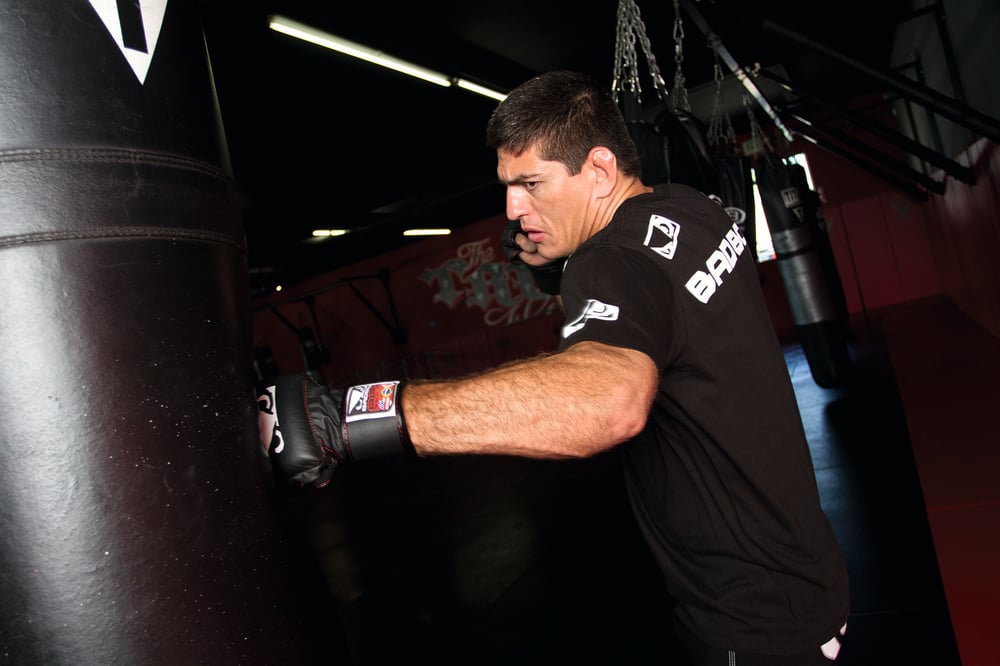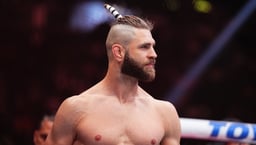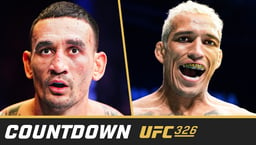
Issue 079
September 2011
Submission specialist and special forces policeman Paulo Thiago is ready to open fire at the UFC’s landmark Rio event
Paulo Thiago doesn’t have a nickname. There’s little room for ego-boosting bluster when you spend your working life fighting drug lords and criminals in the favelas of Brasilia, the fourth largest city in Brazil. The 13-3 UFC welterweight doesn’t need to liken himself to a real-life bad ass, because he eats real-life bad asses before breakfast.
Well known for being a member of Batalhão de Operações Policiais Especiais (BOPE), by comparison Thiago trains MMA and fights in the world’s number-one promotion for his unwind time. A real-life shoot-to-kill special forces police unit trained for urban warfare, BOPE is tasked with things like hostage rescue, suppressing prison riots and wiping out drug ghettos (i.e. the kind of action you only experience vicariously during your Xbox Call of Duty marathons). With a day job like that, Thiago openly admits punching and kicking another man wearing four-ounce gloves for 15 minutes isn’t going to elicit as much as a hand tremble.
That’s not to say his in-ring successes mean any less to him. In fact, his call-up to the UFC in order to act as late replacement against Josh Koscheck at UFC 95 in 2009 was one of the greatest thrills he can remember. “It was like a dream that came true,” gushes the 30-year-old. “It was as if I was selected for the Brazilian soccer team.”
When he steps into the Octagon at UFC 134 around 720 miles up the road in Rio de Janeiro in late August, the UFC’s first visit to Brazil in 13 years is sure to be another of his life highlights. The judoka-cum-boxer expects a vibrant and typically carnival-like environment. “Crowded, yellow and green, with a lot of screaming,” he says.
The Constrictor Team fighter’s journey to the 15,000-seater HSBC Arena began 25 years ago. Training in judo all through his school years starting from five years old; firing a gun might be his life but MMA is his spirit. “I began in judo, then I trained karate, capoeira, amongst other styles. At 14 I started to train jiu-jitsu, and boxing at 16. I always competed either in boxing or jiu-jitsu until 2005 when I had my first MMA fight.”
For the next three years he went undefeated in 10 domestic fights, winning seven of those by submission before debuting in the UFC against Koscheck with a ‘Knockout of the Night’ performance. Widely anticipated to suffer either the frazzle-haired fighter’s fast hands or fast takedowns, his 3:29 first-round stoppage win in the echoing O2 Arena in London was a loud statement of not only his raison d’etre in the UFC’s 170lb division but of his abilities as a surging undefeated prospect.

As ever, though, what goes up must come down. The smothering Jon Fitch served Thiago his first loss at the marquee UFC 100 later that same year. “I think only a person who doesn’t fight doesn’t lose,” ruminates the Brazilian, managed by jiu-jitsu great Wallid Ismail. “The loss showed me how amateur I still was and that I was fighting in a company packed with high-profile athletes.”
Though he went on to win two straight following the decision defeat, Diego Sanchez and Martin Kampmann proved too much for the law enforcer, setting up what could be a must-win in Rio in what is already likely to be an emotional fight for his combative return to his home country.
Passion isn’t something Thiago is light on, and it extends to his desire for MMA to grow in Brazil. While the country may produce some of the sport’s greatest, it’s still a somewhat maligned activity in the soccer-crazed nation. Although the UFC’s Rio show will air on free television across Brazil, the rest of the sport’s coverage is largely out of reach of the majority of the country’s cash-strapped potential fans.
“I think people should have more access to the sport, because the majority of the population doesn’t have cable TV,” reminds Thiago. “But, I think an event in Brazil with many Brazilian idols of the sport will bring greater attention to MMA and help to popularize it even more.”
For a man who spends 48 hours a week, gun in hand, protecting his country and its citizens it seems his concern for others, even if it is for something as relatively trivial as a populace’s interest in his sport, is almost hardwired into him. But what if he had to choose between the two? Between being UFC welterweight champion and crime-fighting champion of the people? “It won’t be necessary to choose,” quips Thiago. “I can be both.”










